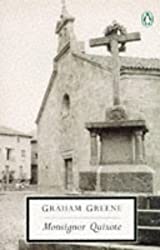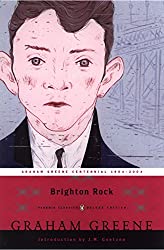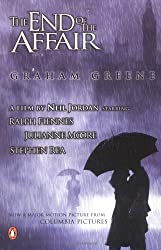
Graham Greene’s Brighton Rock is a book about hell.
It tells of hell on earth. It tells what it is like to live in this world – with barely a trace of humanity.
More specifically, the novel concerns killers and one killer in particular. This is Pinkie, a seventeen year old gangster from a Brighton slum, who had once been a choirboy as a child and had wanted to become a priest.
Pinkie never knows any peace of mind. He is never safe. And so he kills: One person after another person after another person must be ‘dispatched’ to create the illusion of being safe in this world.
And yet Pinkie is marked indelibly by the Mystery of the Catholic Sacraments he received in a childhood unusually horrific.
They have not been enough to save him. He knows, as he murders, that he has chosen the path of mortal sin. But the memories stand out as continuous reminders of an alternate road he has not taken and will not take.
This is the first of Graham Greene‘s series of Catholic novels from 1938.
The picture of life it paints is not pretty.
It is wretched.
The novel that would follow it in 1940, The Power and the Glory is also wretched.
Now, I have also reviewed The Power and the Glory here at this website.
And I should like to borrow a few words from that review.
[Greene] observes the human heart in all its ever shifting tinctures. Tinctures spanning a wide spectrum from malevolence, hatred, contempt and fear to tenderness, heroism, frailty, love and compassion – as well as sublime faith in and dedication to God.

Here is what made Greene great – however it has to be said that unlike The Power and the Glory, the accent in Brighton Rock is much more on ‘malevolence, hatred, contempt and fear’ than anything else.
It is, again, a study of hell. For as Nicholas Berdyaev wrote in The Destiny of Man:
Hell is the state of the soul powerless to come out of itself, absolute self-centredness, dark and evil isolation, i.e. final inability to love.
‘The soul powerless to come out of itself ’…
What is it like to have the mind dwelling continuously on anxiety? What is it like to not be able to trust a single other human being on this Earth?
If someone were to approach you, dear Lector, with nothing but goodwill, what would it be like to not have even the slightest clue that goodwill existed – because virtually nothing of goodwill existed in your own heart?
To not have a clue that another human soul could actually care for you?
Brighton Rock is a meditation on such questions. It is a meditation on the reality and unspeakable tragedy of hell – in the form of the soul of a psychopath. It is a meditation on what it is to be completely walled-off from Christ.
And yet throughout the book, the reader is given the sense that Christ, His angels and His Church, are trying to reach through the wall of Pinkie’s fear and hate – that indeed, despite everything, the light shines on in the darkness.
For Pinkie continuously remembers the Mystery he has witnessed in his horrifying childhood. Towards the end of the novel, Pinkie is moving towards another murder, but, this time, he has formed the barest of emotional attachments to his intended victim.

Here is how Greene reveals the presence of Grace trying desperately to break through – with the suggestion of a statue triggering a memory from his childhood.
He had a sense that somewhere, like a beggar outside a shuttered house, tenderness stirred, but he was bound in a habit of hate. He turned his back and went on up the stairs …
He put the revolver back and went out into the passage. That was the next move. Another statuette painted an obscure moral with cemetery hands and a chaplet of marble flowers, and again he felt the prowling presence of pity.
But Pinkie defies the strange ‘prowling’ of pity for his intended victim and takes her to a car where he begins to drive her to the place he plans for her death. But Pinkie is finding this murder harder than the others …
An enormous emotion beat on him; it was like something trying to get in; the pressure of gigantic wings against the glass. Dona nobis pacem. He withstood it …
If the glass broke, if the beast – whatever it was – got in, God knows what it would do.
He had a sense of huge havoc – the confession, the penance and the sacrament – and awful distraction, and he drove blind into the rain. He could see nothing through the cracked stained windscreen.
We are loathe to give more away. This review, so-called, is less than a real review.
Perhaps it is more like a little tribute to Greene’s genius. There is much else, very much else, in the book we will pass over in silence.
We will just mention briefly the character of Rose – Pinkie’s last intended victim in the above. Rose is another Catholic from the slum. Roses loves the serial killer and out of love for him is fully prepared to be damned with him.
The novel ends with Rose raging to a priest, who understands the nature of a love, willing to be damned for the sake of love.
I will not say much for fear of spoiling. But the ending is potent, potent indeed. Paradoxical, poignant, painful as the priest holds out the hope that Pinkie may yet be saved.
Be warned, dear Reader, if you do not want spoilers – but listen, if you will, to a masterful, heart-rending passage from Greene’s pen:
Rose could just see the old head bent towards the grill. The priest had a whistle in his breath. He listened patiently whistling, while she painfully brought out her whole agony. She could hear the exasperated women creak their chairs outside waiting for confession …
She was defiant and tearless in the stuffy box; the old priest had a cold and smelt of eucalyptus.
He said gently and nasally: ‘Go on, my child.’
She said: ‘I wish I’d killed myself. I ought to ‘ave killed myself … I’m not asking for absolution. I don’t want absolution. I want to be like him damned.’
The old man whistled as he drew in his breath; she felt certain he understood nothing. She repeated monotonously: ‘I wish I’d killed myself.’ …
The old man suddenly began to talk whistling every now and then and blowing eucalyptus through the grill. He said: ‘There was a man, a Frenchman, you wouldn’t know about him, my child, who had the same idea as you. He was a good man, a holy man, and he lived in sin all through his life, because he couldn’t bear the idea that any soul could suffer damnation.’
She listened with astonishment. He said: ‘This man decided that if any soul was going to be damned, he would be damned too. He never took the Sacraments, he never married his wife in church. I don’t know, my child, but some people think he was well, a saint. I think he died in what we are told is mortal sin I’m not sure; it was in the war – perhaps …’
He sighed and whistled, bending his old head. He said: ‘You can’t conceive, my child, nor can I or anyone the … appalling … strangeness of the mercy of God.’
Outside the chairs creaked again and again people impatient to get their own repentance, absolution, penance finished for the week.
He said: ‘It was a case of greater love hath no man than this, that he lay down his soul for his friend.’
He shivered and sneezed. ‘We must hope and pray,’ he said, ‘hope and pray. The Church does not demand that we believe any soul is cut off from mercy.’
She said with sad conviction: ‘He’s damned. He knew what he was about. He was a Catholic too.’
He said gently: ‘Corruptio optimi est pessima.’
‘Yes, Father?’
‘I mean a Catholic is more capable of evil than anyone. I think perhaps because we believe in him we are more in touch with the devil than other people. But we must hope,’ he said mechanically, ‘hope and pray.’
‘I want to hope,’ she said, ‘but I don’t know how.’
‘If he loved you, surely,’ the old man said, ‘that shows … there was some good …’
‘Even love like that?’
‘Yes.’
She brooded on the idea in the little dark box. He said: ‘And come back soon – I can’t give you absolution now – but come back – tomorrow.’
She said weakly: ‘Yes, Father … And if there’s a baby …?’
He said: ‘With your simplicity and His force … Make him a saint to pray for his father.’
A sudden feeling of immense gratitude broke through the pain – it was as if she had been given the sight a long way off of life going on again. He said: ‘Pray for me, my child.’
She said: ‘Yes, oh, yes.’
Greene, I think, accomplishes extraordinary things in his novels. Still, if I were recommending Catholics new to him, I would not recommend starting with Brighton Rock. Despite passages like the above, the book is, for the most part, relentlessly grim and disturbing.
Hands down, I would recommend The Power and the Glory – which is my favourite novel of any that I have ever read …
Still, I remain immensely grateful for the entire series of Greene’s Catholic novels. Brighton Rock forms a dark beginning. More light will break forth as the series proceeds with The Power and the Glory (again reviewed here) and concludes with Monsignor Quixote (reviewed in-depth here).
Foreword for Monarchy by Roger Buck
Buying Books at Amazon Through These Links Gives Us a Commission. This Supports Our Apostolate. Thank You if You Can Help Us Like This!








